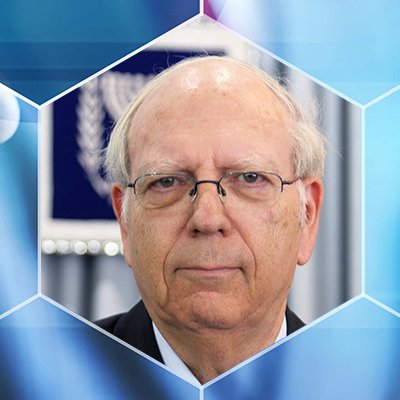
 Click here to jump to the webinar video
Click here to jump to the webinar video
On May 10, 2020, in the fifth installment of CFHU’s HUJI@HOME webinar series, Efraim Halevy, former Director of the Mossad, gave an insightful overview of COVID-19’s impact on Israel’s domestic reality and on its relationship with its Middle East neighbours and other countries further afield.
His presentation began with the home front, which Mr. Halevy said had to endure not only a health crisis due to the current pandemic but also a protracted political crisis resulting from three inclusive elections in the past year. He said he didn’t want to guess the longevity of the new government taking office in the coming days, which had a difficult birth and is the largest in Israel’s history, consisting of more than 30 ministers and 15 or 16 deputy ministers.
“As we know,” Mr. Halevy said, “prophecy is given to fools and I generally don’t like to be a fool, unless it’s absolutely necessary. So I don’t want to predict what’s going to happen with the new government.”
Mr. Halevy, who was also the former head of Israel’s National Security Council, paid tribute to the country’s public health authorities, thanks to whom Israel suffered far less than most countries. Restrictions have now been eased, with most aspects of daily life having re-opened. He pointed out that almost 20% of the country’s doctors and other medical personnel are made up of minorities, primarily Israeli Arabs, who figure prominently in hospital staff. The COVID-19 crisis has made Israelis much more aware of this reality including the fact that Arabs are also becoming more integrated into other aspects of Israeli society. Israelis, he said, will have to recognize things will not to return to the way they were, neither for the Jewish majority nor the Arab minority and that Jewish Israelis will have to find a way to extend a hand to them.
The other community most impacted by COVID-19 is the Haredi (ultra-Orthodox) minority, which suffered the highest proportion of coronavirus cases and in the process had more contact with the country’s non-Haredi majority like never before. One result is a major increase in the use among younger Haredi Israelis of cell phones and the internet. Moving forward, Mr. Halevy said, like with Israelis Arabs, the Jewish majority will have to find a way to better coexist with the Haredi community.
He lamented Israel’s attitude to its elderly population during the pandemic and hoped the country will learn a lesson from the disregard it showed its senior citizens.
According to Mr. Halevy, who formerly headed Hebrew University’s Shasha Center for Strategic Studies at the Federmann School of Public Policy and Government, other major issues Israel now has to wrestle with are the financial crisis and extreme economic suffering from COVID-19 (including a record number of unemployed and faltering businesses), along with the imminent trial of Prime Minister Binyamin Netanyahu on charges of corruption.
Mr. Halevy said one rather surprising result of the health crisis is how it led to cooperation between Israel and the Palestinian Authority, even with Hamas in Gaza, to help control the spread of the virus.
Turning to the region, he cited Iran as the worst hit by COVID-19, saying fatalities from the pandemic are far worse than the already high numbers the government has published. They’ve also suffered losses in their military positions in Syria and Lebanon due to Israeli air force strikes in recent weeks.
Mr. Halevy spoke about COVID-19’s major consequences on the United States, in terms of the number of people dying and the economic fallout, neither of which anyone predicted and which will have lasting impact on the country, possibly including its ability to continue the same level of military aid to Israel.
Two other countries which COVID-19 will leave lasting changes on are Russia, now suffering a dangerous surge in virus-related cases which he said Moscow is underplaying publicly, and China for its role in the origin of the crisis and its lack of transparency in dealing with it.
Mr. Halevy concluded his presentation by responding to questions from participants that touched on a wide spectrum of topics arising from the COVID-19 crisis ranging from intrusive technological surveillance methods Israel used during the lockdown to its post-pandemic relations with Gulf countries if Netanyahu goes ahead with his vow to annex parts of the West Bank, and what will be the degree of global cooperation in the new reality created by the current health crisis.